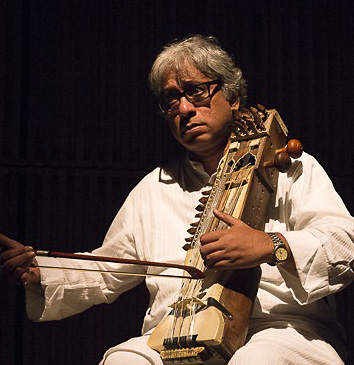Harrie Starreveld (flutes/shakuhachi, The Netherlands) studied flute with Koos Verheul at the Sweelinck Conservatory in Amsterdam. Today Harrie Starreveld is widely regarded as one of the worlds leading specialists in contemporary flute music, working with composers such as Carter, Donatoni, Ferneyhough, Yun, Boulez, Crumb, Harvey, Tan Dun, Loevendie, Weddington and Ton de Leeuw. He is a member of the Nieuw Ensemble since 1982. Together with René Eckhardt and bass-clarinetist Harry Sparnaay he forms Het Trio. As a soloist he performed a large number of flute concertos and worked with conducters such as Ernest Bour, Hans Vonk, Arturo Tamayo and Reinbert de Leeuw. Since 1980, Starreveld has been professor of flute at the Sweelinck Conservatory in Amsterdam and Bremen, regularly gives masterclasses all over the world. He won the prestigious Edison award in 1993 for his CNM Ton de Leeuw-CD and worked at the computer music studios of IRCAM in Paris.

Zhang Shiyi (dizi, China) studies dizi and Chinese music composition at the Shanghai Conservatory Of Music. She was recommended by flute soloist Jiang Guoji to be taught by dizi soloist and educator Zhan Yong Ming in 2009 and started studying traditional music composition with composer Zhu Xiaogu in 2012. In 2013, Shiyi was admitted to the department of Chinese Traditional music at the Shanghai Conservatory of Music. In 2016, Shiyi performed at the Hong Kong Chinese Wind Instruments Festival, composed her first dizi solo piece misty rain in the south of Yangze River area, and was part of the "Yin Cai Zhu Fei talent project" by the Shanghai Conservatory of music, giving a solo concert accompanied by the Zhejiang Chinese Orchestra. Shiyi won various prizes: the silver medal in the "Song Ting Cup" Chinese flute competition 2007 and gold in 2014; a golden prize in the Hongkong international tournament 2013; the second prize of the people's scholarship 2014-2015; and a golden award in the third Hongkong national musical instrument competition 2015.
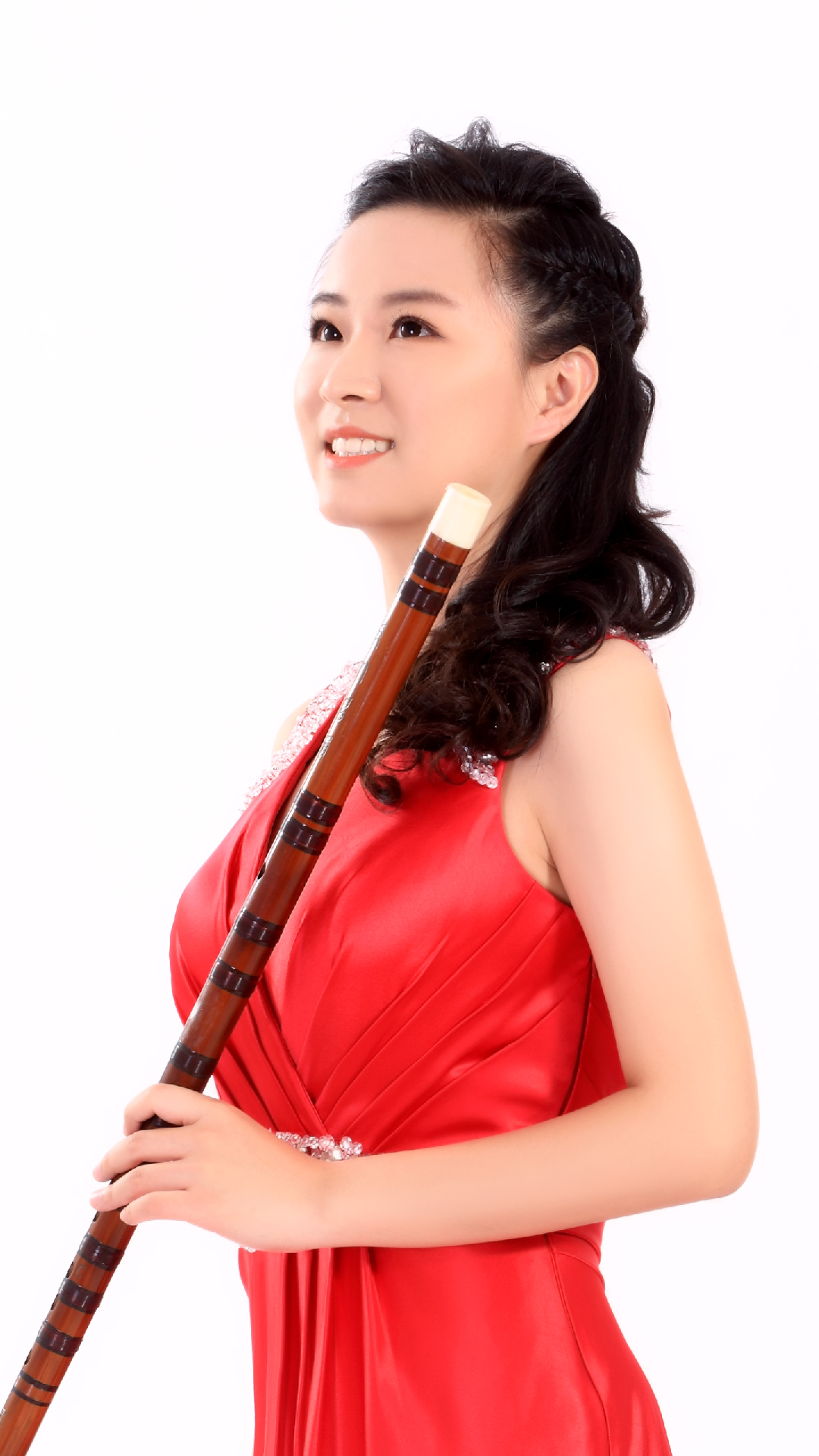
Gevorg Dabaghian (duduk/zurna, Armenia), born in 1965 in Yerevan, Armenia, is among the most prominant duduk players today. He continues the work of his predecessors who left their unique heritage in the history of folk music. Dabaghian is one of the first virtuosos to perform excerpts from the Divine Liturgy of the Armenian church on the duduk, an instrument developed nearly 1500 years ago. He is especially famous for his interpretations of the works by Sayat Nova, and for his performances of traditional Armenian folk music. Gevorg Dabaghyan studied at the Yerevan State Conservatory, where he now teaches. In addition, he is the leader of the Shoghaken Folk Ensemble. He cooperates with renowned musicians such as Yo-Yo Ma and Jan Garbarek. In 2001 Dabaghian participated in "The World's Multi-Voice", an international music project in Moscow. The project had the purpose to unite the artistry of folk instrumentalists of different countries. Here Dabaghian played a duet with violinist Gidon Kremer. This was not unusual: the duduk, which has 3000-4000 years of history, still continues to be heard as an instrument that makes sounds of love and beauty, kindness and joy.
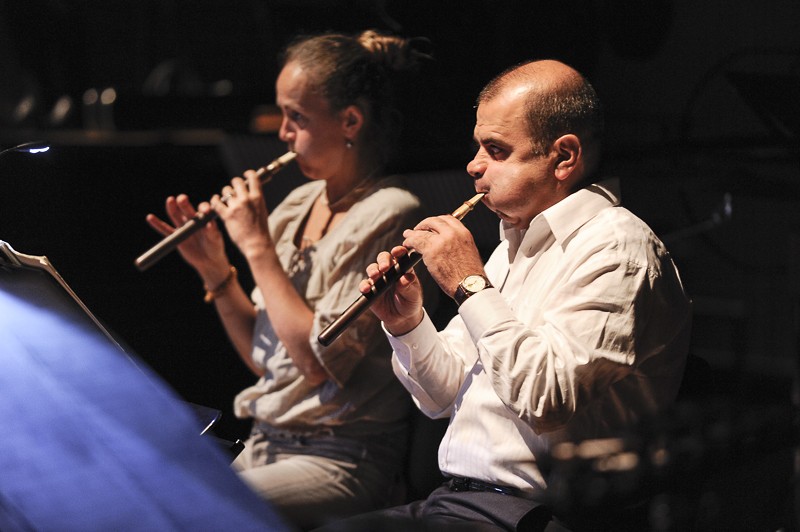
Raphaela Danksagmüller (duduk/recorder, Austria) completed her studies at the Wiener Hochschule für Musik und darstellende Kunst, cum laude, and continued to study recorder at the Conservatorium van Amsterdam with Walter van Hauwe. As a soloist and member of various ensembles Raphaela performed in Europe, Asia and the United States. Raphaela performed as a guest with the Nieuw Ensemble, the Nederlands Blazers Ensemble, the Nederlands Vokaal Laboratorium, the Nederlands Kamerorkest, the Nederlands Kamerkoor, the Residentie Orkest and under Frans Brüggen in the Salzburger Festspiele. Raphaela is a member of the Renaissance ensemble Mezza Luna, Ensemble Thouraya and Zerafin. She was awarded prizes at the International Recorder Symposium Calw in Germany, the Early Music Festival in Brugge/ Belgium and at the International Gaudeamus Competition in the Netherlands. Since 2002 Raphaela has been studying duduk with Gevorg Dabaghian in Yerevan, Armenia.
Ernest Rombout (musette/oboe/English horn, The Netherlands) studied oboe with professor Heinz Holliger in Freiburg, Germany. In 1981 he passed his final examinations cum laude after which he studied with Nikolaus Harnoncourt and Maurice Bourgue. He made his debut as a soloist in 1983 in the Concertgebouw in Amsterdam. Since, Ernest Rombout has enjoyed a busy solo career, appearing with established orchestras and ensembles such as the Radio Symphonie Orchester Berlin, The Prague Chamber Orchestra , the Vienna String Soloists and Nieuw Sinfonietta Amsterdam. Inspired by his performance many composers, amongst which Luca Francesconi, David del Puerto, Claudio Ambrosini and – recently – Seung-Ah Oh, have written new works for him. Rombout is professor of oboe at the Conservatory of Utrecht since 1985 and regularly gives masterclasses and workshops. In the summer of 1998 he was a member of the jury of the International Competition for Oboe in Geneva. Ernest Rombout is member of the Nieuw Ensemble since 1985.
Marco Danesi (clarinet, Italy) graduated at the Giuseppe Verdi Conservatory in Milan, having studied with Professor Sergio Delmastro. He also studied bass clarinet at the J.Horak Academy in Pordenone with Professor Paolo Degaspari. He is studing with Professor Charles Neidich at the Manhattan school of music in New York. Marco performs with Assami, the Annunciata Music Academy, the Brixia Symphony Orchestra and numerous wind orchestras. In 2012, Marco was finalist at the Haverhill Sinfonia Soloist Competition in England. He performed with the ADAMI clarinet choir at the Swiss Clarinet Festival in Lucerne with Paolo Beltramini. He has taken part in masterclasses with Luigi Picatto, Calogero Palermo and Stefano Cardo. In August 2012, Marco attended an advanced course in the Netherlands with Charles Neidich, teacher at the Julliard School in New York. Pursuing his interest in modern music, Marco performed SUR with the “Laboratory of Contemporary music of Milan”, which was written by Lauri Mantyssari who won the first prize at the International Composition Competition. Marco is involved in contemporary chamber music collaborating with the Dedalo Ensemble, with whom he has performed a concert at the Quirinale Palace in Rome.
Hua Yifei (sheng, China) was born in the Jiang Su province. He started learning dizi(Chinese bamboo flute) when he was nine. In 2007 he was admitted to the Music Middle School, affiliated to the Shanghai Conservatory of Music. Since then he began to learn sheng with Xu Chaoming, who is an authority in this field. Since 2013 he is studying in the Department of Chinese Music at the Shanghai Conservatory of Music, with the famous pioneer sheng soloist Wu Wei as his teacher. Yifei has been awarded the People Scholarship for seven times from 2008 to 2015. He is a member of the Atlas Ensemble since 2013. Hua Yifei won numerous prizes: a golden award in the International Chinese Instrument Competition in Guang Zhou (2011); in 2012 the first prize of the Tang Junyuan Educational Foundation, the second prize of the Shanghai city scholarship and the outstanding student prize of Star Plan. In 2013 he attended the Jinqi Ensemble as the sheng soloist in Shanghai. They won the second prize in the 9th Golden Bell Prize (a top music prize in China). In 2016 he participated in the Hongkong Chinese Wind Instruments Festival, and held his personal sheng concert named solar planet at the Shanghai Conservatory of music.
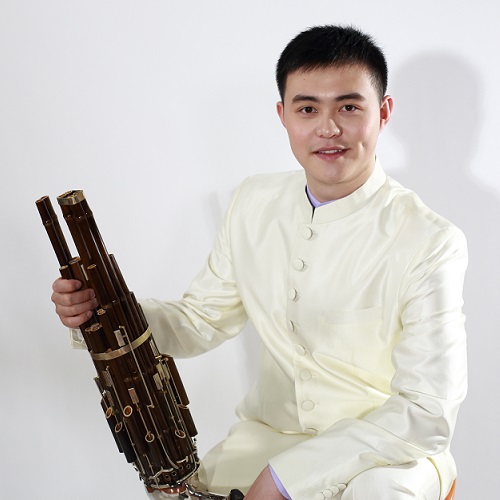
Naomi Sato (sho, Japan) was born in Japan in 1975. She studied sho with Ko Ishikawa and saxophone with Nobuya Sugawa at the Tokyo National University of Fine Arts and Music where she graduated in 1998. After that she continued her saxophone studies with Claude Delangle (France) and with Arno Bornkamp at the Conservatorium of Amsterdam from which she graduated in 2002. Naomi Sato has collaborated with many composers and played with various international ensembles. In the Netherlands she has performed on sho with flutist Harrie Starreveld, saxofone player Olivier Sliepen, the Ives Ensemble and composers Theo Loevendie and Merlijn Twaalfhoven. Naomi Sato was semi-finalist at the Second International Adolphe Sax Concours in Dinant (1998) and won the third prize at the Saxophon Wettbewerb Gustav Bunke in Hannover (1999). She played with the Philharmonic Orchestra of the Tokyo National University of Fine Arts and Music, and the Residentie Orkest/The Hague Philharmonic.

Yu Lingling (pipa, China/Geneva) was born in Hangzhou in the south-east of China. She began to study the violin, the erhu, and later concentrated on the pipa. By the age of fourteen, she was awarded the first prize at the entrance examination for the Central Conservatory of music in Beijing. Considered as a prodigy, a documentary movie was published on her exceptional musical abilities (Chun Lei, Little Genius) as well as various other TV and press reports. Lingling Yu obtained her bachelor's degree in Arts at the China Conservatory of music in Beijing. In the same year she was appointed as lecturer at Tsinghua University in Beijing. At twenty-five years old, she won the national competition of Chinese traditional music in Beijing. Together with her master Dehai Liu, professor and composer, she travelled throughout China, teaching and giving public performances. She also studied with other famous pipa professors such as Jieli Luo, Fandi Wang and Weixi Sun. To explore the links between western and eastern music, she settled in Switzerland in 1998. She studied orchestration with Jean Balissat at the University of music in Lausanne (1998-99), afterwards harmony with Pierre Studer, counterpoint with Kurt Sturzenegger, orchestration with Xavier Dayer, improvisation with David Dolan and Marco Ferrari and took part in the composition course of Eric Gaudibert and Nicolas Bolens, and other classes at the University of music in Geneva (2000-05). In 2016, she was nominated the Swiss Grand Award for Music, which will be announced in September 2016.
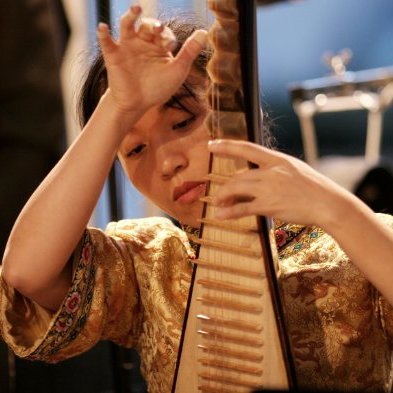
Kiya Tabassian (setar, Iran/Canada) was born in 1976 in Tehran, immigrating to Quebec in 1990. He has been trained in Persian music under Reza Ghasemi and Kayhan Kalhor. He studied musical composition at the Conservatoire de musique de Montréal with Gilles Tremblay. In 1998, he co-founded Constantinople, a Montreal based ensemble which has earned an international reputation for its unique juxtaposition of early musical sources and the living traditions of the Middle East. Kiya has toured intensively in Canada, Belgium, Portugal, Italy, Spain, Holland, France, Cyprus, Lebanon, Greece, Hong Kong and Mexico. He has recorded numerous CDs for the ATMA label and has created with Constantinople over 20 original programs performing them at some of the most prestigious festivals and venues such as Festival d'Aix-en-Provence (France), Festival de Musiques Sacrées de Fès (Morocco), Festival d'Ile de France (Paris), Metropolitan Museum (New York), Festival de Mexico en el Centro historico (Mexico) and Vancouver Summer Festival (Canada). From 2002 to 2005, he was involved in the international MediMuses research project on the history and repertoire of Mediterranean music land in several publishing and recording projects. As a composer, he has been commissioned by UER, CBC and Nouvel Ensemble Moderne. He is currently a board member of the Montreal Art Council, and the president of the music section.

Elchin Nagijev (tar, Azerbaijan) was born in 1966 in the Neftchala district in Azerbaijan. He studied his instrument, the tar, at the College for Professional Music from 1982 to 1986 and continued his studies from 1986 to 1993 at the Baku Music Academy. Elchin Nagijev regularly works with kamancha player Elshan Mansurov and is a widely acclaimed performer of the mugam. He is a teacher at the Baku Music Academy, responsible for the mugam classes.

Nizar Rohana (ud, Palestine) was born in the village of 'Isifya on Mount Carmel near Haifa city in 1975. From a young age, Rohana played music, picking up the ud when he was 13. Following extensive studies and teaching in musicology, ud performance and composition, Rohana immersed himself in developing contemporary ud compositions, taking inspiration from the practise of Bach, Mozart, Beethoven, Chopin and Brahms all the way to Tanburi Cemil Bey, Kemani Tatyus Efendi, Muhammad Al-Qasabji and Muhammad Abdel Wahab. As a performer, Rohana’s wide stage experience as a soloist and within groups encompasses playing traditional, modern, experimental and world music. During the last fifteen years he performed in countries such as Japan, Morocco, Egypt, Turkey and in the USA and Europe, releasing his first album Sard (Narration) in 2008. In 2001 he was awarded a Bachelor of Music and Arts (specialisms in ud performance and musicology) from the Jerusalem Academy for Music and Dance and the Hebrew University. He then focused his work on the music of Egyptian composer Muhammad Al-Qasabji, completing his Master’s degree in 2006. Between 2000 and 2007 Rohana worked as one of the main ud teachers at the Edward Said National Conservatory in Jerusalem, Ramallah and Bethlehem. Since September 2013, he has been based in the Netherlands pursuing his PhD in improvisation and composition in solo ud performance at Leiden University Academy for Creative and Performing Arts, as part of a doctoral programme designed for musician-researchers, docARTES.
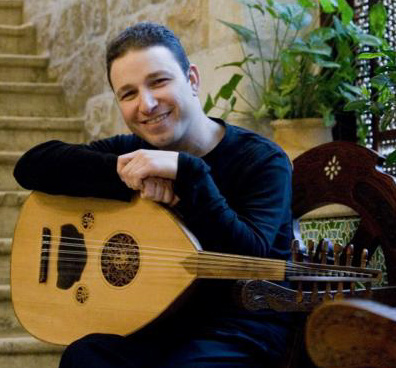
Bassem Alkhouri (qanun, Syria) was born in 1976 in Damascus. He graduated from the Conservatory in Damascus in 2000 as a specialist in qanun and subsequently won the second prize for playing qanun at the International Music Competition in Algeria. Bassem is also a singer, graduating in opera singing at the Royal Conservatory in The Hague in May 2006 and gaining a Masters degree the following year from the Dutch Opera Academy in Amsterdam. As a soloist Bassem performed with his qanun in many concerts with the National Syrian Symphony Orchestra, as well as giving concerts in Iraq, Lebabon, Egypt, Morocco, Tunesia, Kuwait, France and England. As a singer he performed the solo part in Mozart Requiem at the special opening of the National Opera House of Damascus and in two contemproray opera's by Rokus de Groot and Wim de Ruyter. Since 2003 he is a regular guest musician with the New Ensemble. Bassem Alkhouri is member of both the Ziggurat Ensemble and the Atlas Ensemble.

Ding Xueer (zheng, China) started her study in 2001 at the Central Music Institute Accesorial Middle School and continued at the China Central Conservatory of Music in 2007. Xueer won various prizes, played during the Olympic Games 2008 for world leaders and recorded a CD with traditional Chinese music for foreign guests. In 2011 she performed as zheng ambassador in various countries, including Ireland, Japan, Indonesia and the US. She was invited to record with 'Splendid China' as the only Chinese musician, produced by the BBC in 2013. In the same year Xueer performed with the Leipzig Radio Symphony Orchestra and toured in the US. She also collaborated with the China National Symphony Orchestra, Beijing Symphony Orchestra, China Youth Symphony Orchestra and Philadelphia Orchestra.
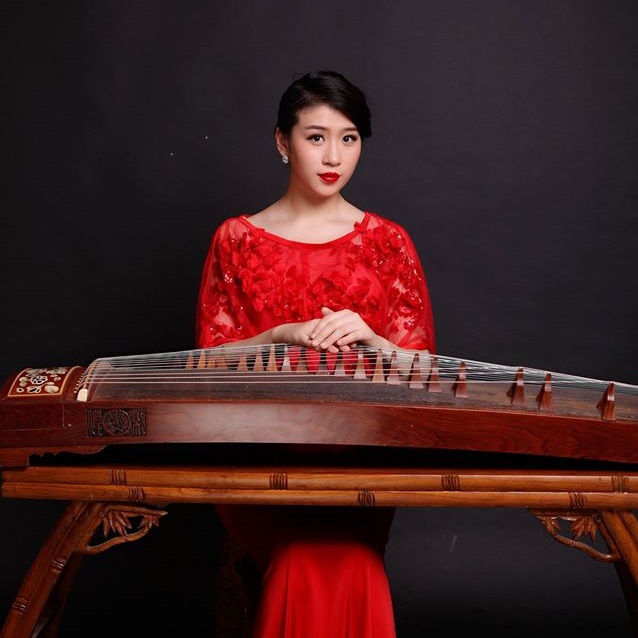
Ernestine Stoop (harp, The Netherlands) studied at the Sweelinck Conservatorium in Amsterdam. She continued her studies with harpist Pierre Jamet and violinist Sandor Végh. After playing for 11 years with the Radio Philharmonic Orchestra, she is now dedicating herself fully to playing as a solist, chamber music and teaching. Ernestine is a member of the Nieuw Ensemble and Asko|Schönberg, and harp-professor at the Royal College of Music in The Hague and the Fontys High School of Music in Tilburg. As a soloist she performed with conductors such as Hans Vonk, Ernest Bour, Jean-Jacques Kantorow, David Porcelijn, Ed Spanjaard, Reinbert de Leeuw, Rogier van Otterloo and James Last. She has enjoyed numerous and productive sessions with composers such as Mauricio Kagel, Isang Yun, Karlheinz Stockhausen, Elliott Carter, Louis Andriessen, Franco Donatoni, Theo Loevendie, Guo Wenjing and Guus Janssen preparing their compositions for first performances. She initiated the 3rd and 5th European Harp Symposium in Amsterdam and recently a real Carillo-harp has been made for her. This is a unique 16th tone instrument designed by Juan Carrillo (Mexican composer) early 20th century. Ernestine has been the artistic director of the prestigeous 10th World Harp Congress 2008.

Elshan Mansurov (kamancha, Azerbaijan) was born in 1962 in the Gazah district of Azerbaijan. After completing his studies at the College for Professional Music in Azerbaijan in 1981, he continued his musical training at the Baku Music Academy from 1985 until 1990. From 1986 he has worked for many years with the Mugam Trio of the world famous singer Alim Qasimov. One of Mansurov’s major achievements as a professional kamancha player has been winning the first prize at the Folk Musical Instruments Competition. He promoted Azerbaijan Mugams in many countries of the world. Since 1990 he is professor at the Baku Music Academy. In 2007 he was awarded the title of Honored Artist of Azerbaijan Republic.
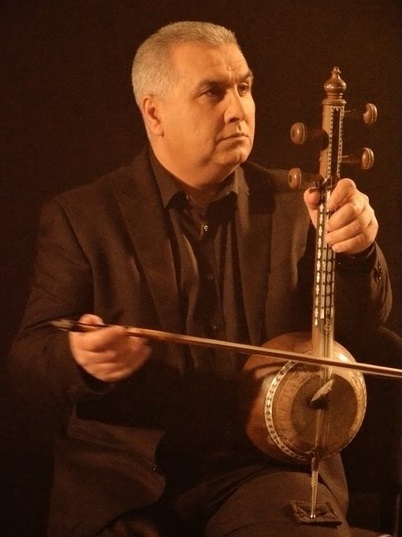
Neva Özgen (kemençe, Turkey), born in 1977 in Ankara, grew up in Istanbul surrounded by Turkish classical music and jazz. She learned to play flute but after entering the Istanbul Technical University Conservatory she switched to clarinet. It wasn't long before her interest in Turkish classical music overtook her interest in Western classical traditions and she decided to study the kemençe, an instrument integral to Turkish classical music. She studied with Alaeddin Yavasca. Neva has deeply immersed herself in the works and taksims of Tanburi Cemil Bey, Münir Nurettin Selçuk and Bekir Sidki Sezgin. Like many kemençe players in Turkey today, she aims to continue the tradition established by Tanburi Cemil Bey which was passed on to her father. Ihsan Özgen's influence on his daughter cannot be underestimated and Neva Özgen can be considered a student of what is recognized as the ‘Ihsan Özgen school’ of Turkish classical music. She has accompanied him in performances of Turkish classical music in Europe, the United States and Turkey.

Dhruba Ghosh (sarangi, India), born in 1957, is acknowledged as one of the leading exponents of the traditional North Indian bowed instrument. The renaissance of the sarangi in India owes much to his development of the instrument's techniques and range of sound and innovations within the fabric of the traditional idiom. He is the son of tabla-master and teacher Pandit Nikhil Ghosh and owes the mastery of the traditional Bundu-Khan style to many years of study under Ustad Sagiruddin Khan. Dhruba Gosh performs regularly at the music centers of his homeland India accompanying front-ranking North Indian vocalists. Concert tours take him to Europe, the USA and Japan and he is a frequent guest at several European festivals such as the Helsinki International Music Festival and Silk Route Festival in Athens. He collaborated with Ensemble Modern Frankfurt among other classical, jazz and crossover musicians in the West, having worked next to traditional players from diverse origins. He has been at the core of the formation of a World String Orchestra in Japan involving the traditional bowed instruments of Japan, China, Korea, Uzbekistan and India. Presently he is the principal of the Bharatiya Vidya Bhavan’s Sangeet and Nartan Shikshapeeth, Mumbai. He is also a composer of classical and light music of India. He teaches and lives in Mumbai.
